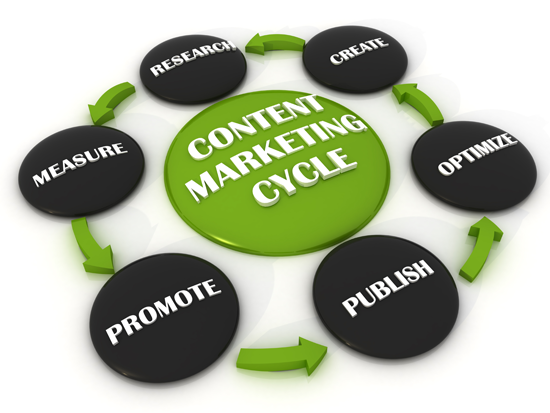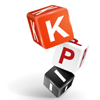Using the Right Key Performance Indicators for Your Content Marketing Campaign

The consumer-marketing model has transitioned from a passive, zero-gain model to one in which consumers are only willing to pay attention and consume a marketing message if there is some intrinsic value to them.
In the modern world, there are too many channels on television, radio and especially the Internet for a consumer to sit still for a promotion that is of no interest to them. In order to obtain the interest of the consumer, a content marketing message should be informational, engaging and educational. This is why content marketing is extremely important, but this type of Internet marketing can only be effective if it is accurately measured. Key performance indicators or KPIs are the metric for determining the success of any content marketing campaign.
Content Marketing Remains Highest Priority in Marketing Industry
Most businesses have heard of content marketing but what exactly is it? According to the Content Marketing Institute, content marketing is: "a marketing technique of creating and distributing valuable, relevant and consistent content to attract and acquire a clearly defined audience - with the objective of driving profitable customer action."
Content marketing can be comprised of a variety of digital mediums and formats which may include text, images and videos. Additionally, many businesses have a false assumption and think that in creating a single piece of content, they will get viewers to consume and immediately buy their products and services shortly after consuming the content. As Rand Fishkin describes, content marketing actually requires creating a variety of digital assets, then measuring the impact each has over time to see how each one resonates and impacts users.
The way to understand this resonation is through analytical tools such as Google Analytics which provide various key performance indicator data. Fishkin also talks on concepts that it usually takes several pieces of content along with repeated visits to build and nurture a relationship with prospects which solidifies strong relationships with potential customers. After a certain level of reach, engagement and sentiment has been established, prospects will be more likely to consider purchasing products and services from a company because a genuine relationship has already been established and a real need has risen.

As you can probably imagine, these mature consumer relationships, are immensely valuable and well worth the investment, which is why the marketing community covets them intensely. In a 2013 conjunction survey by Econsultancy and Adobe, 39 percent of all digital marketers said content marketing was their top priority compared to 2012, where only 29 percent emphasized it. More importantly, this trend is expected to continue as more marketing professionals recognize the benefits of content marketing.
Intelligent and Agile Businesses are Reaping the Rewards of Content Marketing
The immense rewards of a successful content marketing campaign include additional site traffic, brand elevation and of course increased conversions and sales. These benefits have captured the attention of the business community which has bought into the concept with zeal. In a survey by emarketer almost three quarters of small businesses are using content marketing to promote their organizations, and 75 percent of these companies intend to increase content production in the coming year.
Content Marketing Generates More Benefits than Other Channels
According to a study by Curata, marketers rated how content marketing has benefited their organization and agreed that:
- Almost 85 percent of respondents said content marketing increased brand awareness.
- Three quarters of respondents cited an increase in customer engagement.
- More than 70 percent said it increased thought leadership and authority.
- About 72 percent stated it enhanced site traffic.
- More than 60 percent responded that it improved lead quality as well as quantity.
Content Marketing Costs Less Over Other Traditional Marketing
In an aggregate survey by Kapost, it was revealed that content marketing is only about 62 percent the cost of other types of marketing, while producing almost three times as many leads. These leads were typically graded as higher quality. It also found that website conversion rates improve six-fold for content marketers over non-adopters.
Which Digital Assets are businesses focusing on for Content Marketing?
Emarketer indicates that the businesses prioritize and value their content marketing by the following percentages: articles (55 percent), social media content (54 percent), blog posts (53 percent) and videos (53 percent).
How Key Performance Indicators Measure Content Marketing Success

The power of effective content marketing can hardly be underestimated, but it is just as important to utilize all of the metrics involved so you can determine the impact of your marketing efforts. Key performance indicators act similar to a set of gauges in your car dashboard which allow you to visualize and understand the impact your content is making on your prospective audience. KPIs allow you to identify your most effective content and adjust your marketing strategy for optimal effect.
Reach - Key Performance Indicator
As noted earlier, one of the most important benefits of content marketing is its ability to increase reach. That begins with producing content that is appealing enough that it is attracting and extending out to new prospective audiences. Key Performance Indicators associated with reach can be measured in terms of: page views, unique visitors, geographical physical location, gender, age, referral source, etc. Common analytic platforms used to measure reach include Google Analytics, Kissmetrics, and Clicky.
Engagement - Key Performance Indicator
While reach measures the extent your content marketing is spreading through the Web, social media and in the rest of the online universe, engagement KPIs measure the emotional depth of impact it is having on your audience. Customer engagement is quite important because it indicates how sustained your relationship is to your audience. The longer and more intense that engagement with your brand and content, the more likely they will retain memories of the visit, return to interact with new content and recommend your brand to others.
Examples of Engagement Metrics Include:
- Length of visit - the time invested on new content is an important indicator of how appealing your new material is to visitors.
- Number of blog comments - the impact your content makes can often be measured by user generated content which comes in the form of blog comments. It doesn't simply stop at the number of comments, but also what users are saying specifically. Savvy marketers understand the hidden gems blog comment provide such as spotting key authority influencers (e.g. Klout Score) while also dissecting user generated content to uncover potential topics for future content marketing campaigns.
- Recommendations & Social Signals - if your content is being linked to, tweeted, +1 and liked, or if your content is recommended in forums and blogs and the like, you can be assured that it is being favorably accepted. People will typically only recommend a piece of content they are really passionate about or connected to.
Sentiment KPIs Gauge the Attitude of Visitors
Engagement and reach help provide insights into the general consumer community, but they don't provide a broad perspective and consensus of your people feel about your brand in general. Sentiment Key Performance Indicators provide you with these insights. There are a variety tools like Twendz, Sentiment140 and Attensity360 which can pinpoint mentions of your organization and paint a picture of your reputation among consumers. This type of information can be critical in identifying social sites and communities which might respond well to directed content marketing.
Conversions are the Ultimate Goal

As we have read above, content marketing has the ability to produce one of the highest ROI of any marketing technique. Content marketing often produces many more leads than other types of methods and those leads typically are of greater quality. This is related to the fact that solid content with engaging information spurs determined actions. In other words, once a visitor acquires key pieces of information, you are assisting them in moving down the sales funnel while strengthening the relationship. It is also important to sustain your content production efforts; it takes repeated visits to convince typical visitors to buy in to your organization.
Conclusion
In conclusion, content marketing has become a necessity for digital marketing, and key performance indicators are the measuring sticks which help guide that strategy. With KPIs that measure reach, engagement and sentiment, you can develop an accurate picture of how your content is being perceived. These performance metrics should identify content that is resonating most powerfully with your ideal customers and what steps can be taken to refine and improve it.









